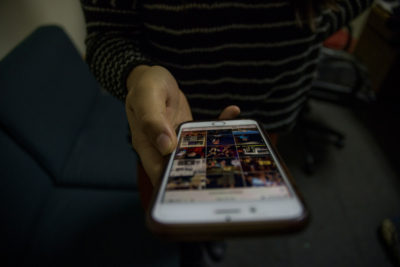
The college admissions cycle is in full swing, and many high school seniors are cleaning up their Twitter feeds and changing their Facebook names on the uncertain premise that admissions officers are scanning them.
College admissions officers are increasingly looking at applicants’ social media when reviewing applications — according to Kaplan Test Prep — but despite this pattern, BU officials say they have too many applicants to factor all students’ social media into their decision-making.
Since 2008, Kaplan has been studying the role of social media in admissions processes. In its most recent survey released earlier this year, of the 350 college admissions officers surveyed, 35 percent reported evaluating prospective applicants’ online profiles, according to Russell Schaffer, a spokesperson for Kaplan.
Schaffer said social media provides college admissions officers with a view of “the unfiltered version of the applicant.”
“The admissions process itself is often packaged and scripted,” Schaffer said. “This lets admissions officers see something a little bit extra.”
Furthermore, online profiles relay information to officers that can significantly impact chances of admission, Schaffer said. In fact, 47 percent of admissions officers surveyed who’ve looked at applicant’s’ social media reported that it positively impacted their view of students, and 40 percent said it had the opposite effect.
In evaluating applicants’ social media platforms, admissions officers may specifically look at mentions of their university, according to Schaffer.
Several schools reported to Kaplan that students have tweeted negative impressions of their college while on a campus tour or bragged about acing an interview with a “safety school,” he said.
But in BU’s case, due to its large applicant pool, it does not usually factor social media into college admissions decisions, spokesperson Colin Riley said.
“Given the volume of applications that Boston University receives, our admissions professionals do not have the ability to evaluate every applicant’s social media presence,” Riley said.
However, certain circumstances could prompt admissions officers to take a look at an applicant’s social media, such as if a prospective student mentioned their online presence in an essay, Riley said.
Schaffer noted that even with the increasing prevalence of social media, traditional factors in admissions — including standardized testing scores and GPA — still play the dominant role in determining admissions decisions.
“When in doubt, leave it out,” Schaffer said. “You don’t necessarily have to share everything, and the hunt for likes and shares can lead down a path of unintended consequences.”
College of Communication graduate affairs administrator Rebecca Liudzius said she doesn’t think colleges should consider social media content when admitting students because it defeats their original purpose.
“I just feel like universities checking social media takes away a little bit of the authenticity and fun of social media because people are not being their true selves,” Liudzius wrote in an email.
After a student has accepted their admission officer, Liudzius wrote that she thinks colleges have the license to look at the incoming student’s social media specifically for abusive content, citing a June incident at Harvard College as an example.
“The school rescinded their offers to 10 students who were a part of a group that joked about the Holocaust, child abuse, etc,” she wrote. “I totally support that. Those students broke Harvard’s rules, and Harvard took appropriate action.”
Liudzius added that since social media is definitely becoming a more prevalent factor in college admissions, students will have to adapt to this change.
Several BU students said they believe social media is an appropriate way to reveal more about a person in the college application process.
Christopher Suarez, a freshman in the College of Arts and Sciences, said when applying to colleges, he was aware that admissions officers might look at his social media. However, he said he wasn’t concerned.
“If you’re posting things that you shouldn’t be posting, it does say something about you,” Suarez said. “But at the same time, I think that the image that people portray on social media isn’t always very consistent with who they are.”
Zaharoula Blanas said when she was applying to colleges, she noticed a trend of people trying to evade college admissions officers by changing their name on social media. Still, she believes social media is a fair factor for admissions officers to consider.
“Social media is open to whomever,” the CAS senior said. “I don’t know if they should be considering it heavily, but I don’t think it’s wrong of them to be looking at that.”
Similarly, CAS sophomore Dean Weeden also said he thinks social media is fair and supplements information about students on their official applications.
“While [social media] is revealing at times, I think also it’s more of a second check as opposed to something that should be used right off the bat,” Weeden said.




